【BBC六分钟英语】你的通勤工具是什么?
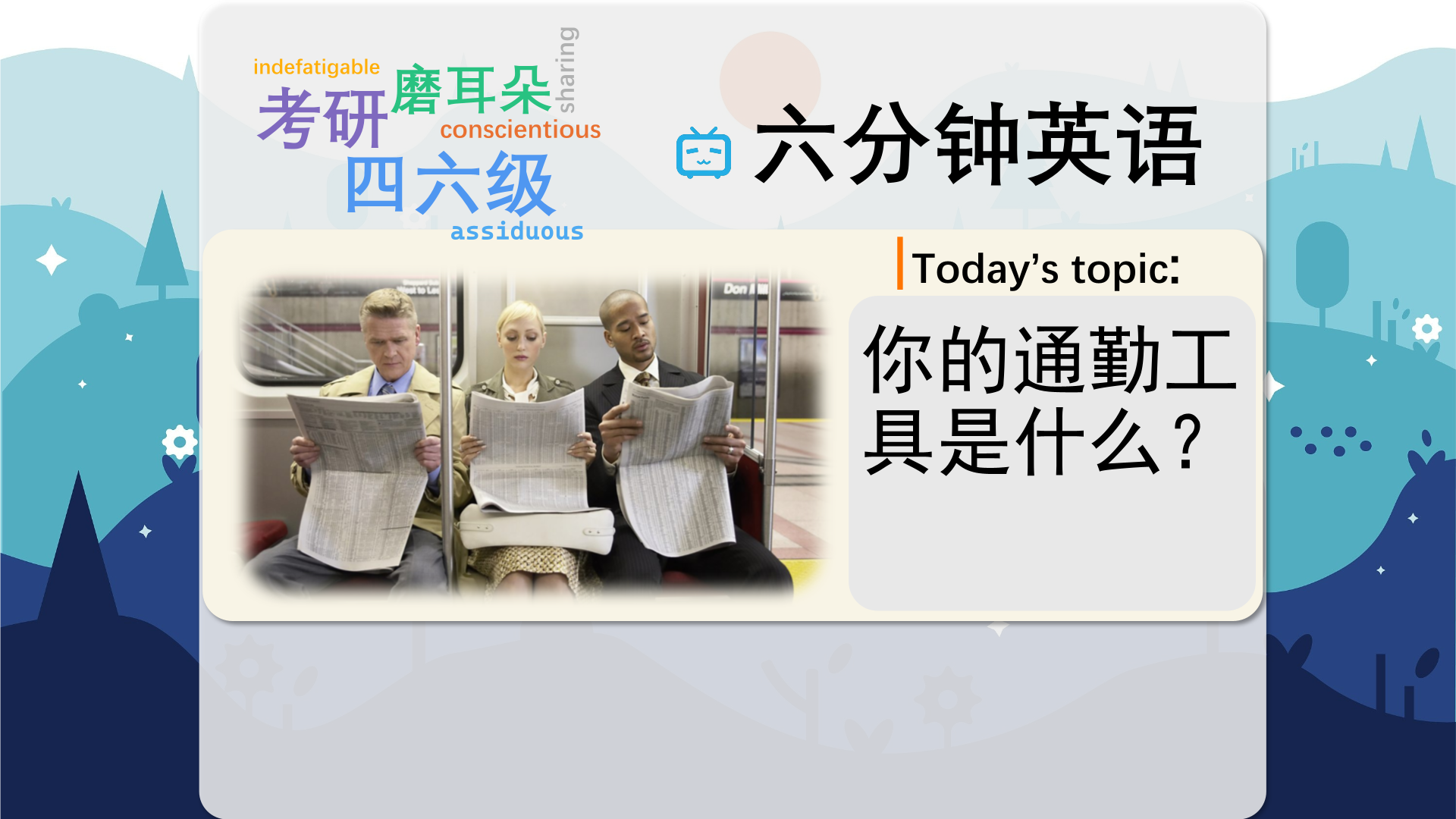
【英文脚本】
Neil
Hello and welcome to 6 Minute English. I’m Neil…
Alice
… and I’m Alice. Now Neil, how do you get to work?
Neil
I cycle.
Alice
I didn’t know that! Somehow I hadn’t imagined you as a cyclist. And where’s all your bike gear?
Neil
Well, I sneak in in the mornings, have a shower, and get changed. That’s my bike in the corner over there.
Alice
Oh, you’ve got a foldaway bike, which means it folds up so it’s easy to carry or put away. Do you wear lycra, Neil?
Neil
Yes, I do… it’s very comfortable. I wear lycra as often as I can. Lycra by the way is a stretchy fabric used in tight-fitting sports clothes.
Alice
Well, I’ll have to see if I can catch you on your way into the building, I’m intrigued about this sporty Neil I didn’t know about!
Neil
‘Intrigued’ means to be very interested in something. Well, Alice, I’m flattered. And today’s show is about commuting, or travelling between your home and your work. So how did you commute this morning, Alice?
Alice
I got the Tube, that’s the subway system here in London, also known as the underground – and it was a nightmare. We stopped in a tunnel for so long that people started talking to each other.
Neil
And for those of you who aren’t Londoners, that’s unusual! Do you ever talk to people on the train?
Alice
No. People think you’re crazy if you talk to strangers.
Neil
Well, maybe now’s a good time to talk about today’s quiz question, Alice. What question do you have for me?
Alice
Alright then. I know you like my questions, Neil. So here we go: What did the word ‘commuter’ originally describe? Was it someone who… a) travelled with other people? b) paid a reduced fare to travel? Or c) travelled by train to work?
Neil
Oh, that’s easy. I’m going to go for c) travelled by train to work.
Alice
Well, we’ll find out later whether you’re right or not. Now let’s listen to a commuter in Nairobi who takes a matatu to get to work. These are minibuses used as shared taxis in East Africa. Can you spot a word that means being quick to notice things going on around you?
Commuter, Nairobi, Kenya
When I’m stuck in the matatu there is a lot of strange things happen around you, so you have to be alert in Nairobi. When you open… when you leave your window open somebody can run away with your belongings. You may be speaking… using the phone… somebody just snatch your phone… you may expect the unexpected!
Neil
The word used by this commuter in Kenya is alert. And in these noisy, crowded buses you need to be alert in case someone runs away with your belongings, belongings are the things that you own.
Alice
Right. Somebody might snatch your phone, snatch means to take something quickly.
Neil
Public transport in Nairobi sounds stressful! If I was taking the bus I’d want to have a nap – or short sleep.
Alice
Yes. Well, people have done research on commuting and stress levels, and interestingly women are more likely to experience stress during their journey than men.
Neil
Why’s that?
Alice
Well, they’re more likely to do something which is being called ‘trip chaining’, where they make one or more stops on the way to work or going home, for example to drop off or pick up the kids from school, and this makes it more likely that something will go wrong with their journey.
Neil
Even if you aren’t trip chaining it’s no fun being stuck in a traffic jam, that’s a large number of vehicles close together moving slowly, or being packed into a crowded train like sardines. Let’s face it, travelling by car or by public transport can be really miserable!
Alice
Yes. Packed in like sardines describes people standing so close together that they can’t move, like fish in a can! So let’s hear how longer commutes can affect your health from US researcher Christine Hoehner.
Christine Hoehner, researcher at Washington University School of Medicine
My study found that adults who commuted longer distances from home to work were less physically active, less physically fit, weighed more and had higher blood pressure than those people who had shorter commutes.
Neil
The American researcher must be talking about commuters who aren’t engaged in active travel, mustn’t she? Because if you cycle a longer distance then you’re being more physically active.
Alice
I think you’re right, for once, Neil!
Neil
Yeah.
Alice
And I’d better start going to the gym more. I don’t like the sound of high blood pressure.
Neil
Why don’t you hop on your bike, Alice? Then we can both wear lycra to work.
Alice
That’s a fantastic idea, Neil! Moving on! Here’s the answer to today’s quiz question. I asked: What did the word ‘commuter’ originally describe? Was it someone who… a) travelled with other people? b) paid a reduced fare to travel? Or c) travelled by train to work?
Neil
And I said c) travelled by train to work. It must be right.
Alice
And you were wrong I’m afraid, Neil! It’s b) someone who paid a reduced fare to travel. The Oxford Dictionary says the word ‘commute’ comes from from Latin commutare, from com- ‘altogether’ + mutare ‘to change’. The word was used in the US in the 1840s, when people paid a reduced or commuted fare to travel by rail from the suburbs into the city.
Neil
OK. Can you tell us the words we heard today again, Alice?
Alice
Of course I can. Here they are: foldaway bike lycra intrigued commuting the Tube alert belongings snatch nap traffic jam packed in like sardines commuted
Neil
Well, that’s the end of today’s journey with 6 Minute English. Please do join us again soon.
Both
Bye.
【中英文双语脚本】
Neil(尼尔)
Hello and welcome to 6 Minute English. I’m Neil…
您好,欢迎来到 6 Minute English。我是 Neil…
Alice(爱丽丝)
… and I’m Alice. Now Neil, how do you get to work?
…我是 Alice。现在 Neil,你怎么开始工作?
Neil(尼尔)
I cycle.
我循环。
Alice(爱丽丝)
I didn’t know that! Somehow I hadn’t imagined you as a cyclist. And where’s all your bike gear?
我不知道!不知何故,我没有想象过你是一名骑自行车的人。你的自行车装备都在哪里?
Neil(尼尔)
Well, I sneak in in the mornings, have a shower, and get changed. That’s my bike in the corner over there.
嗯,我早上偷偷溜进去,洗个澡,换衣服。那是我在那边角落里的自行车。
Alice(爱丽丝)
Oh, you’ve got a foldaway bike, which means it folds up so it’s easy to carry or put away. Do you wear lycra, Neil?
哦,你有一辆折叠式自行车,这意味着它可以折叠起来,因此很容易携带或收起。你穿莱卡吗,Neil?
Neil(尼尔)
Yes, I do… it’s very comfortable. I wear lycra as often as I can. Lycra by the way is a stretchy fabric used in tight-fitting sports clothes.
是的,我愿意。。。非常舒适。我尽可能多地穿莱卡。顺便说一句,莱卡是一种用于紧身运动服的弹性面料。
Alice(爱丽丝)
Well, I’ll have to see if I can catch you on your way into the building, I’m intrigued about this sporty Neil I didn’t know about!
好吧,我得看看我能不能在你进大楼的路上赶上你,我对这个我不知道的运动型 Neil 很感兴趣!
Neil(尼尔)
‘Intrigued’ means to be very interested in something. Well, Alice, I’m flattered. And today’s show is about commuting, or travelling between your home and your work. So how did you commute this morning, Alice?
“Intrigued”的意思是对某事非常感兴趣。嗯,爱丽丝,我受宠若惊。今天的节目是关于通勤,或者说在你的家和你的工作之间旅行。那么,Alice,你今天早上是怎么通勤的呢?
Alice(爱丽丝)
I got the Tube, that’s the subway system here in London, also known as the underground – and it was a nightmare. We stopped in a tunnel for so long that people started talking to each other.
我坐上了地铁,那是伦敦的地铁系统,也被称为地铁 —— 那简直是一场噩梦。我们在隧道里停了很久,人们开始互相交谈。
Neil(尼尔)
And for those of you who aren’t Londoners, that’s unusual! Do you ever talk to people on the train?
对于那些不是伦敦人来说,这很不寻常!你有没有在火车上和人交谈过?
Alice(爱丽丝)
No. People think you’re crazy if you talk to strangers.
不。如果你和陌生人说话,人们会认为你疯了。
Neil(尼尔)
Well, maybe now’s a good time to talk about today’s quiz question, Alice. What question do you have for me?
好吧,也许现在是谈论今天的测验问题的好时机,Alice。您有什么问题要问我?
Alice(爱丽丝)
Alright then. I know you like my questions, Neil. So here we go: What did the word ‘commuter’ originally describe? Was it someone who… a) travelled with other people? b) paid a reduced fare to travel? Or c) travelled by train to work?
好吧。我知道你喜欢我的问题,Neil。那么我们来吧:“通勤者”这个词最初描述了什么?是不是有人……a) 与其他人一起旅行?b) 支付了降价旅行?或 c) 乘火车上班?
Neil(尼尔)
Oh, that’s easy. I’m going to go for c) travelled by train to work.
哦,这很容易。我要去 c) 乘火车上班。
Alice(爱丽丝)
Well, we’ll find out later whether you’re right or not. Now let’s listen to a commuter in Nairobi who takes a matatu to get to work. These are minibuses used as shared taxis in East Africa. Can you spot a word that means being quick to notice things going on around you?
好吧,我们稍后会知道你是对还是错。现在让我们听听内罗毕的一位通勤者乘坐 matatu 去上班。这些是东非用作共享出租车的小巴。你能找到一个词来表示快速注意到你周围发生的事情吗?
Commuter, Nairobi, Kenya(通勤者,内罗毕,肯尼亚)
When I’m stuck in the matatu there is a lot of strange things happen around you, so you have to be alert in Nairobi. When you open… when you leave your window open somebody can run away with your belongings. You may be speaking… using the phone… somebody just snatch your phone… you may expect the unexpected!
当我被困在 matatu 时,你周围会发生很多奇怪的事情,所以你在内罗毕必须保持警惕。当您打开时…当你把窗户打开时,有人可能会带着你的财物逃跑。您可能会说…使用电话…有人只是抢走了你的手机……您可能会期待意想不到的事情!
Neil(尼尔)
The word used by this commuter in Kenya is alert. And in these noisy, crowded buses you need to be alert in case someone runs away with your belongings, belongings are the things that you own.
肯尼亚的这个通勤者使用的词是 alert。在这些嘈杂、拥挤的公共汽车中,您需要保持警惕,以防有人带着您的物品逃跑,这些物品就是您拥有的东西。
Alice(爱丽丝)
Right. Somebody might snatch your phone, snatch means to take something quickly.
好的。有人可能会抢走你的手机,抢夺的意思是快速拿走东西。
Neil(尼尔)
Public transport in Nairobi sounds stressful! If I was taking the bus I’d want to have a nap – or short sleep.
内罗毕的公共交通听起来很紧张!如果我坐公共汽车,我想小睡一会儿 —— 或者睡个好觉。
Alice(爱丽丝)
Yes. Well, people have done research on commuting and stress levels, and interestingly women are more likely to experience stress during their journey than men.
是的。好吧,人们已经对通勤和压力水平进行了研究,有趣的是,女性在旅途中比男性更容易感到压力。
Neil(尼尔)
Why’s that?
为什么呢?
Alice(爱丽丝)
Well, they’re more likely to do something which is being called ‘trip chaining’, where they make one or more stops on the way to work or going home, for example to drop off or pick up the kids from school, and this makes it more likely that something will go wrong with their journey.
嗯,他们更有可能做一些被称为 “行程链 ”的事情,他们在上班或回家的路上停下来或多停,例如接送孩子放学,这使得他们的旅程更有可能出错。
Neil(尼尔)
Even if you aren’t trip chaining it’s no fun being stuck in a traffic jam, that’s a large number of vehicles close together moving slowly, or being packed into a crowded train like sardines. Let’s face it, travelling by car or by public transport can be really miserable!
即使你没有行程链,被困在交通拥堵中也不是一件好玩的事,那就是大量靠近的车辆缓慢行驶,或者像沙丁鱼一样挤在拥挤的火车上。让我们面对现实吧,开车或乘坐公共交通工具旅行真的很痛苦!
Alice(爱丽丝)
Yes. Packed in like sardines describes people standing so close together that they can’t move, like fish in a can! So let’s hear how longer commutes can affect your health from US researcher Christine Hoehner.
是的。像沙丁鱼一样包装 描述人们站得如此之近,以至于他们无法移动,就像罐头里的鱼一样!那么,让我们听听美国研究员 Christine Hoehner 对通勤时间的影响如何影响您的健康。
Christine Hoehner, researcher at Washington University School of Medicine(ChristineHoehner,华盛顿大学医学院研究员)
My study found that adults who commuted longer distances from home to work were less physically active, less physically fit, weighed more and had higher blood pressure than those people who had shorter commutes.
我的研究发现,与通勤时间较短的人相比,从家到工作地点通勤距离较长的成年人身体活动较少,身体状况较差,体重较重,血压较高。
Neil(尼尔)
The American researcher must be talking about commuters who aren’t engaged in active travel, mustn’t she? Because if you cycle a longer distance then you’re being more physically active.
这位美国研究人员一定在谈论那些不积极旅行的通勤者,不是吗?因为如果你骑车的距离更长,那么你的身体活动就会更加活跃。
Alice(爱丽丝)
I think you’re right, for once, Neil!
我认为你是对的,这一次,尼尔!
Neil(尼尔)
Yeah.
是的。
Alice(爱丽丝)
And I’d better start going to the gym more. I don’t like the sound of high blood pressure.
我最好开始多去健身房。我不喜欢高血压的声音。
Neil(尼尔)
Why don’t you hop on your bike, Alice? Then we can both wear lycra to work.
爱丽丝,你为什么不跳上你的自行车呢?然后我们都可以穿着莱卡上班。
Alice(爱丽丝)
That’s a fantastic idea, Neil! Moving on! Here’s the answer to today’s quiz question. I asked: What did the word ‘commuter’ originally describe? Was it someone who… a) travelled with other people? b) paid a reduced fare to travel? Or c) travelled by train to work?
这真是个好主意,尼尔!继续前进!这是今天测验问题的答案。我问:“通勤者”这个词最初描述的是什么?是不是有人……a) 与其他人一起旅行?b) 支付了降价旅行?或 c) 乘火车上班?
Neil(尼尔)
And I said c) travelled by train to work. It must be right.
我说 c) 坐火车去上班。它一定是对的。
Alice(爱丽丝)
And you were wrong I’m afraid, Neil! It’s b) someone who paid a reduced fare to travel. The Oxford Dictionary says the word ‘commute’ comes from from Latin commutare, from com- ‘altogether’ + mutare ‘to change’. The word was used in the US in the 1840s, when people paid a reduced or commuted fare to travel by rail from the suburbs into the city.
恐怕你错了,尼尔!是 b) 支付了减价旅行的人。牛津词典说,“通勤”这个词来自拉丁语 commutare,来自 com- ‘完全’ + mutare ‘改变’。这个词在 1840 年代在美国使用,当时人们支付减价或通勤票价,从郊区乘坐火车进入城市。
Neil(尼尔)
OK. Can you tell us the words we heard today again, Alice?
还行。Alice,您能告诉我们今天我们再次听到的话吗?
Alice(爱丽丝)
Of course I can. Here they are: foldaway bike lycra intrigued commuting the Tube alert belongings snatch nap traffic jam packed in like sardines commuted
我当然可以。他们在这里: 折叠式自行车 莱卡 好奇 通勤 地铁 警报 物品 抢夺 午睡 交通堵塞 像沙丁鱼一样挤在一起 通勤
Neil(尼尔)
Well, that’s the end of today’s journey with 6 Minute English. Please do join us again soon.
好了,这就是今天六分钟英语旅程的结束。请尽快再次加入我们。
Both(双)
Bye.
再见。

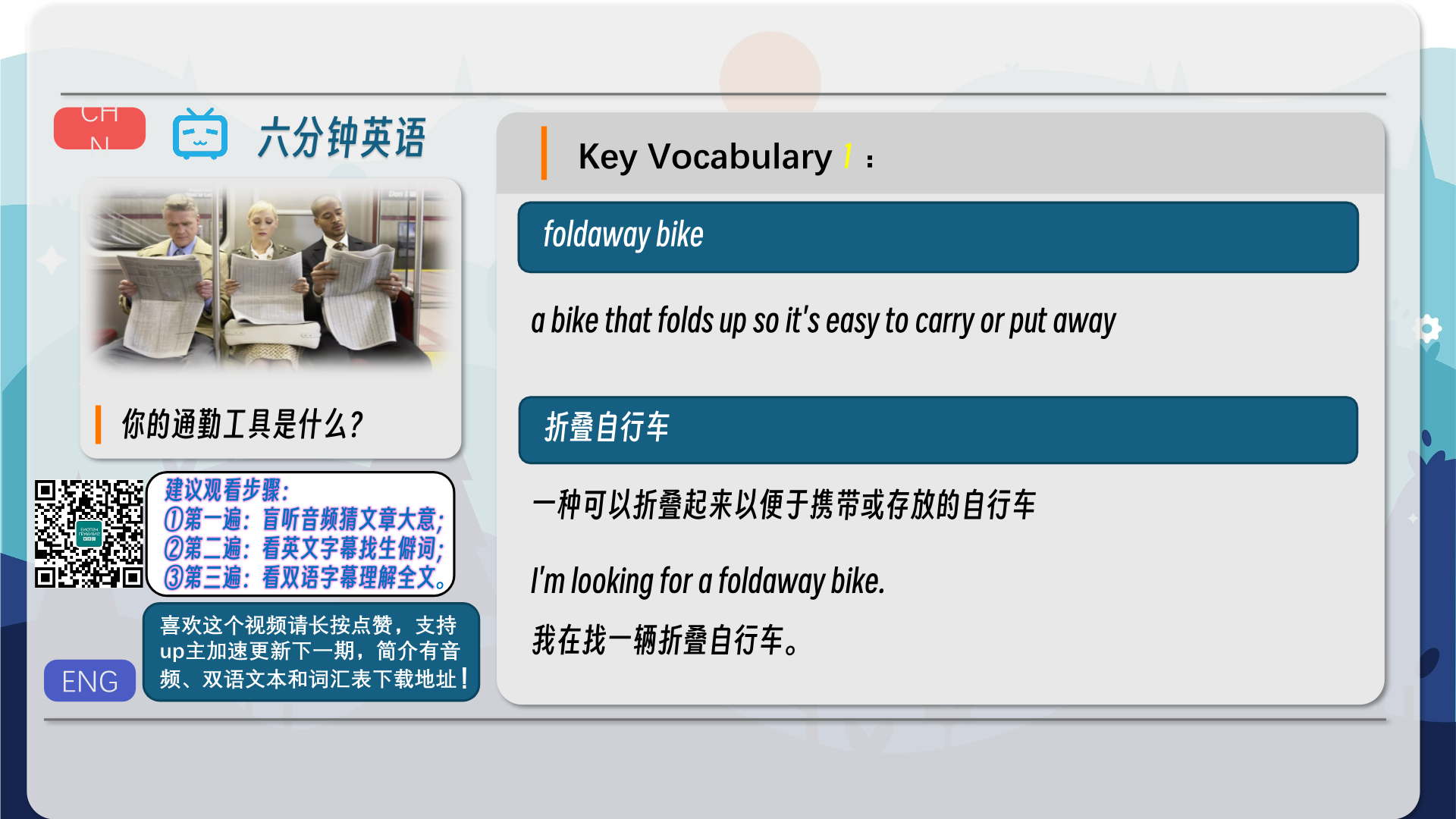
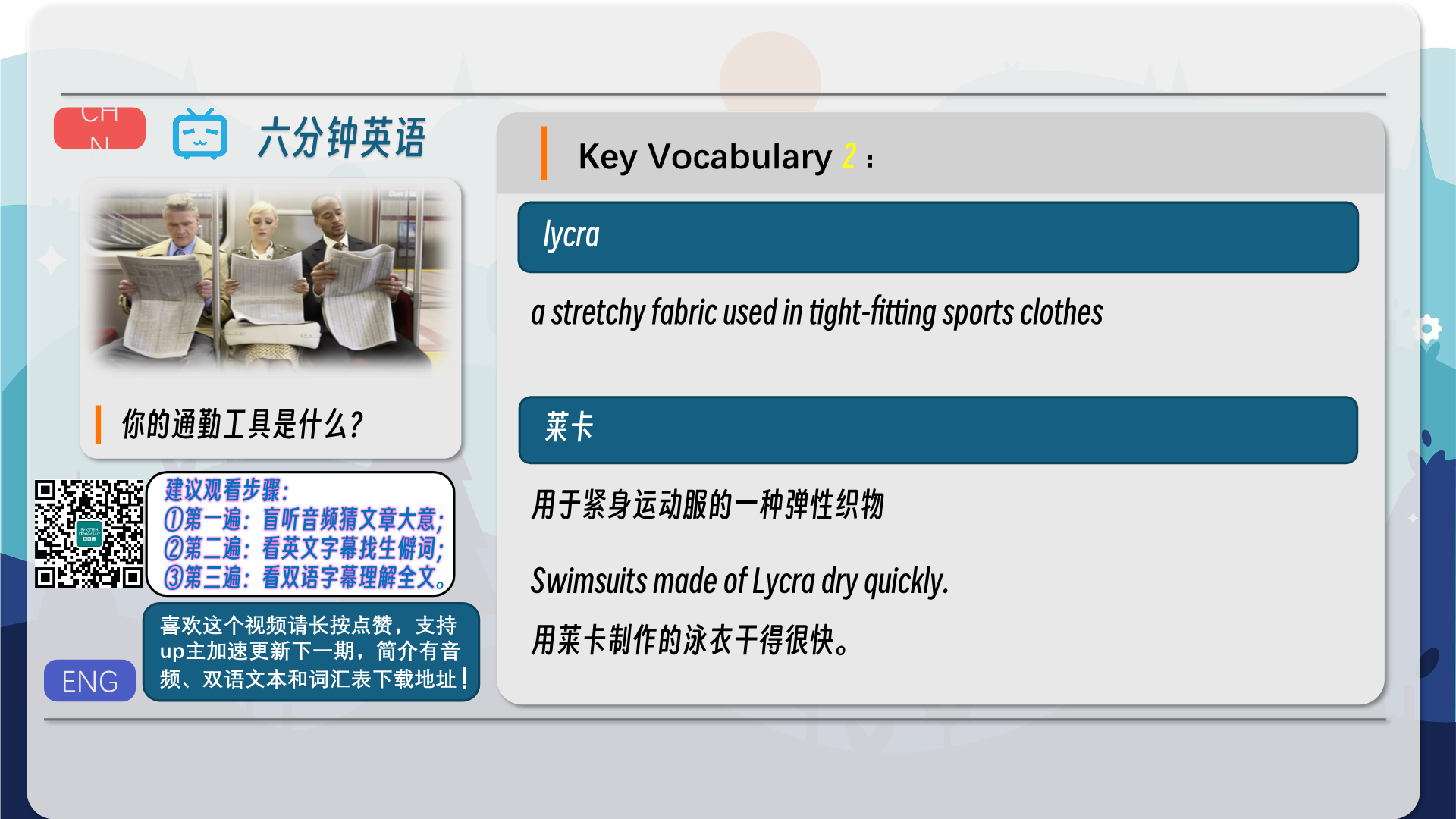
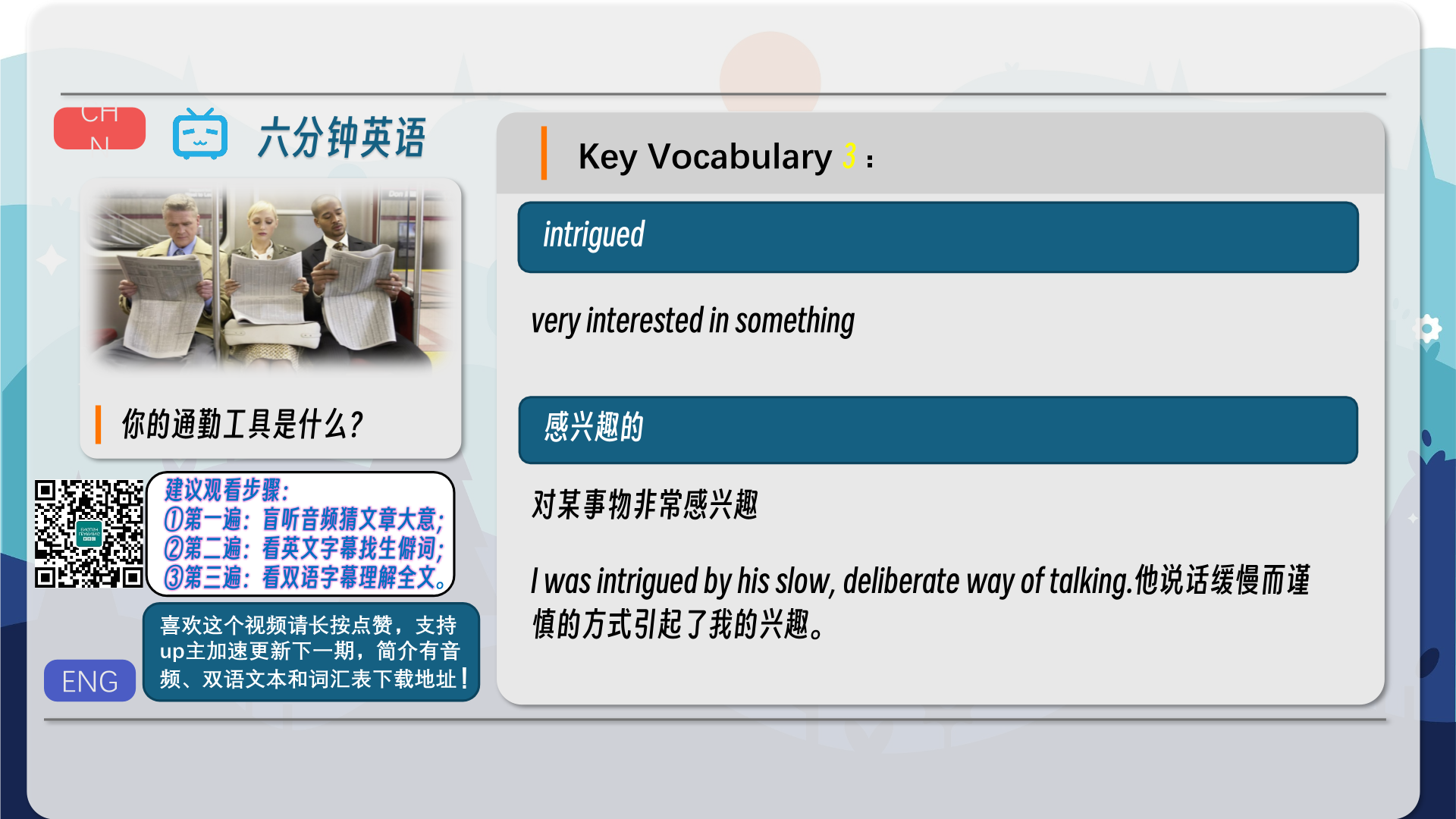
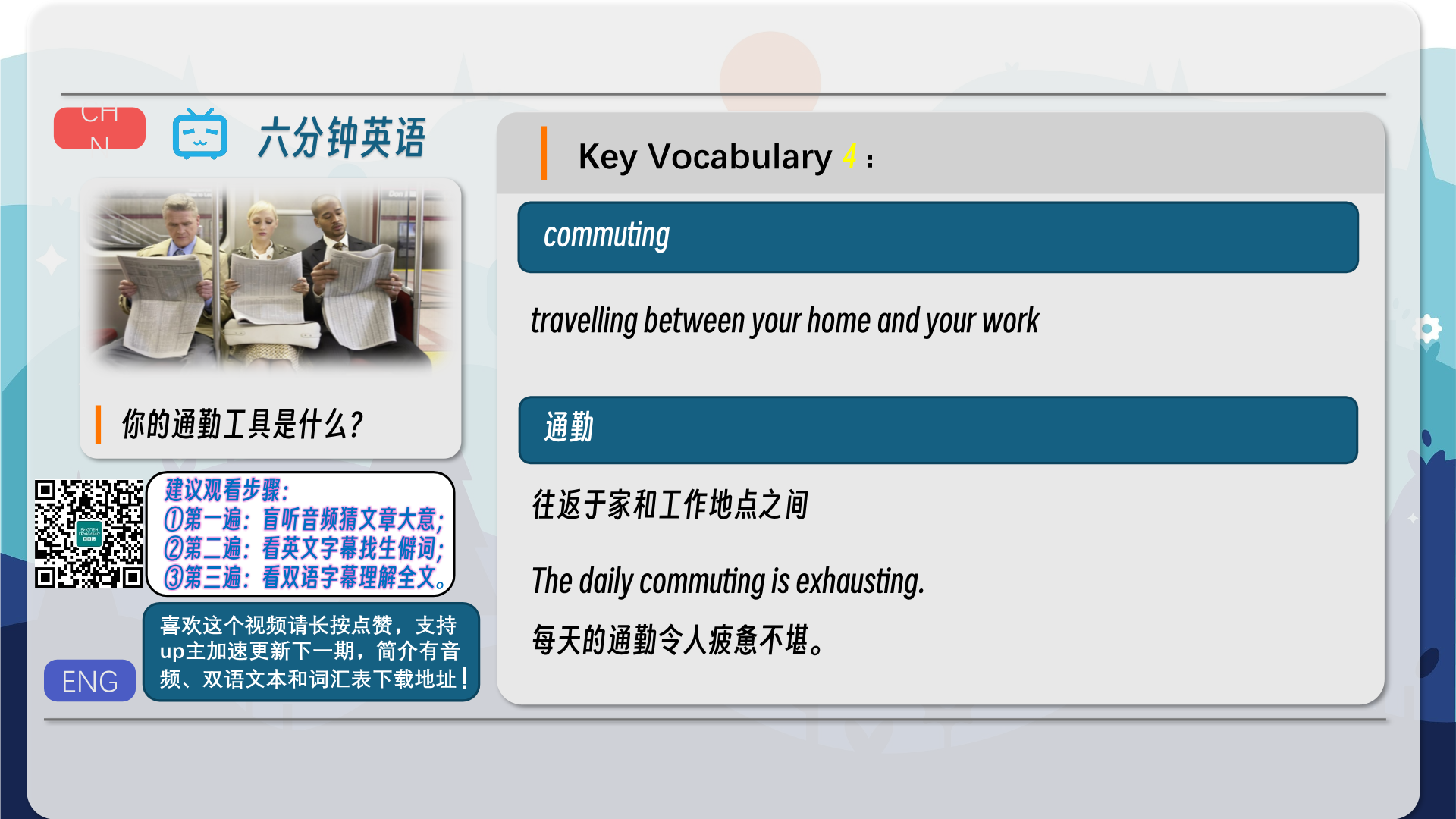

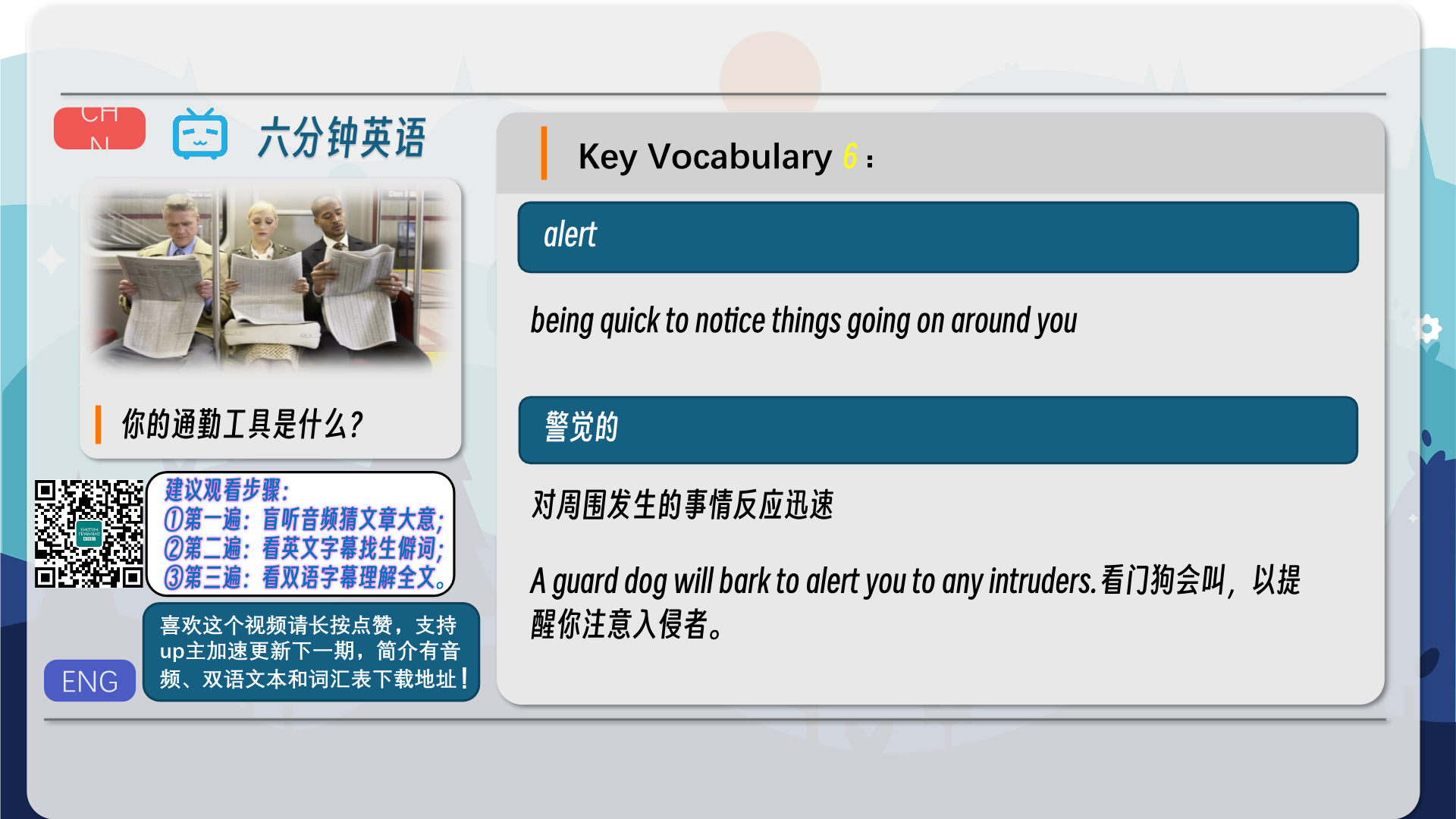
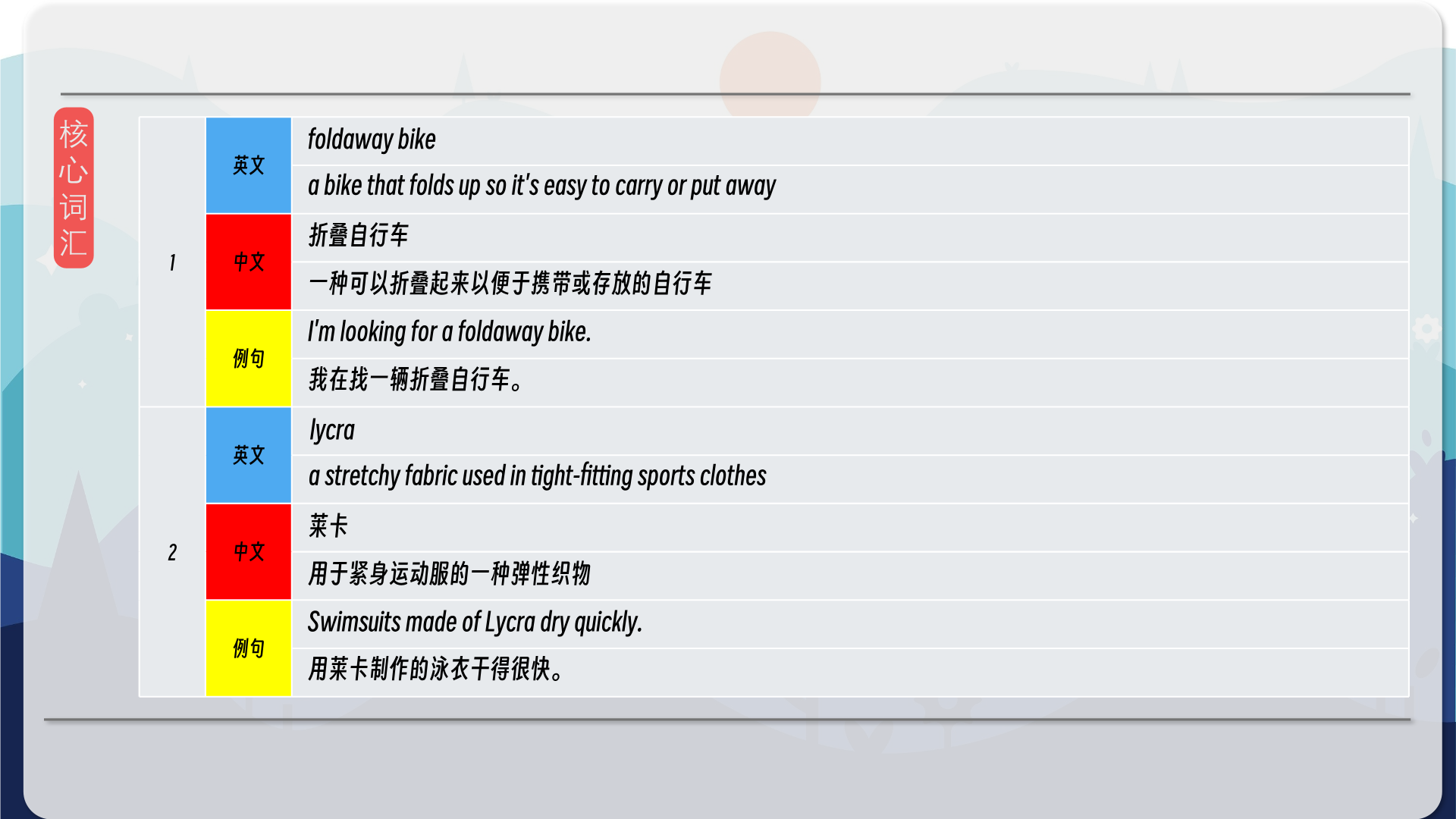
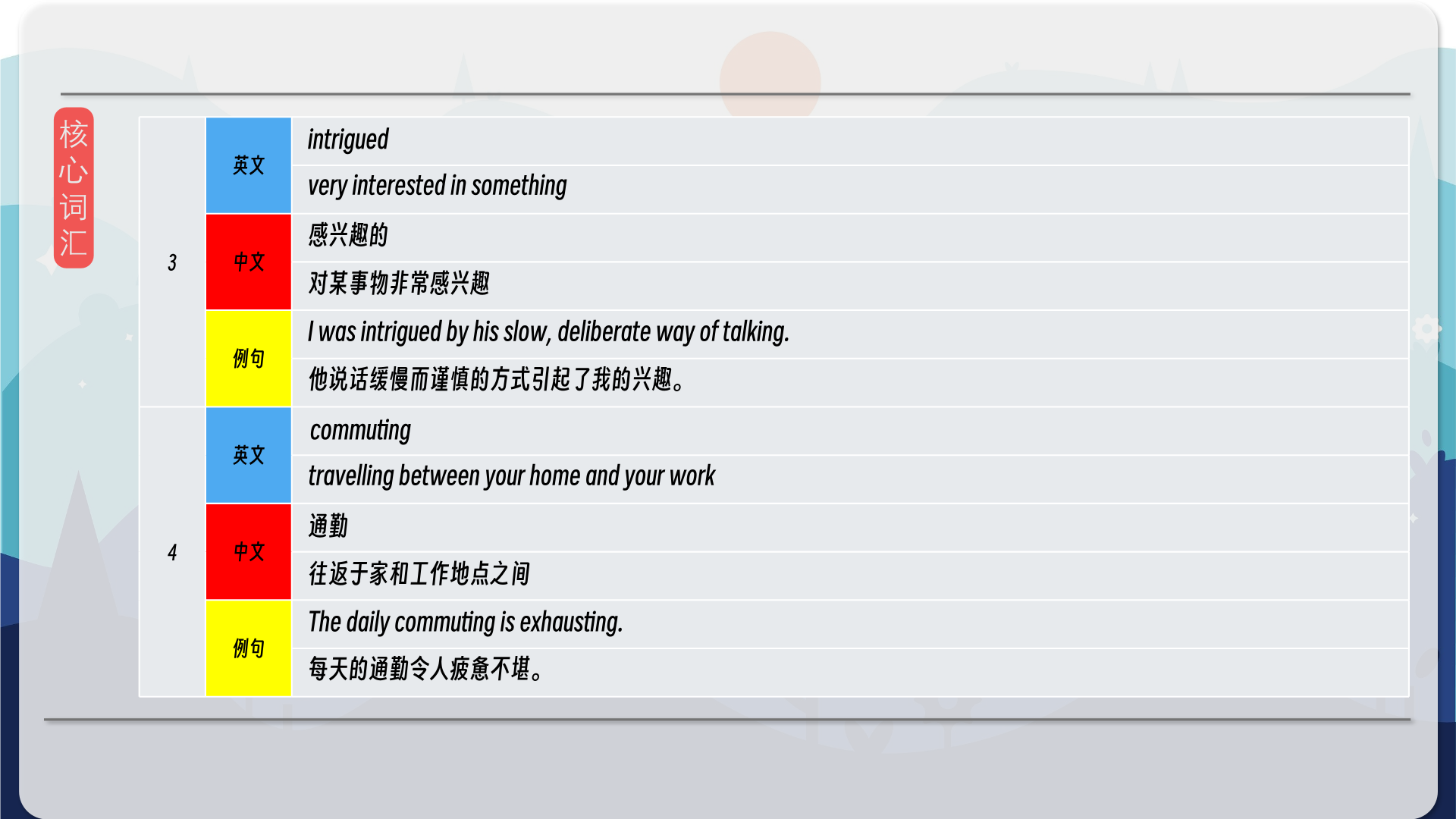
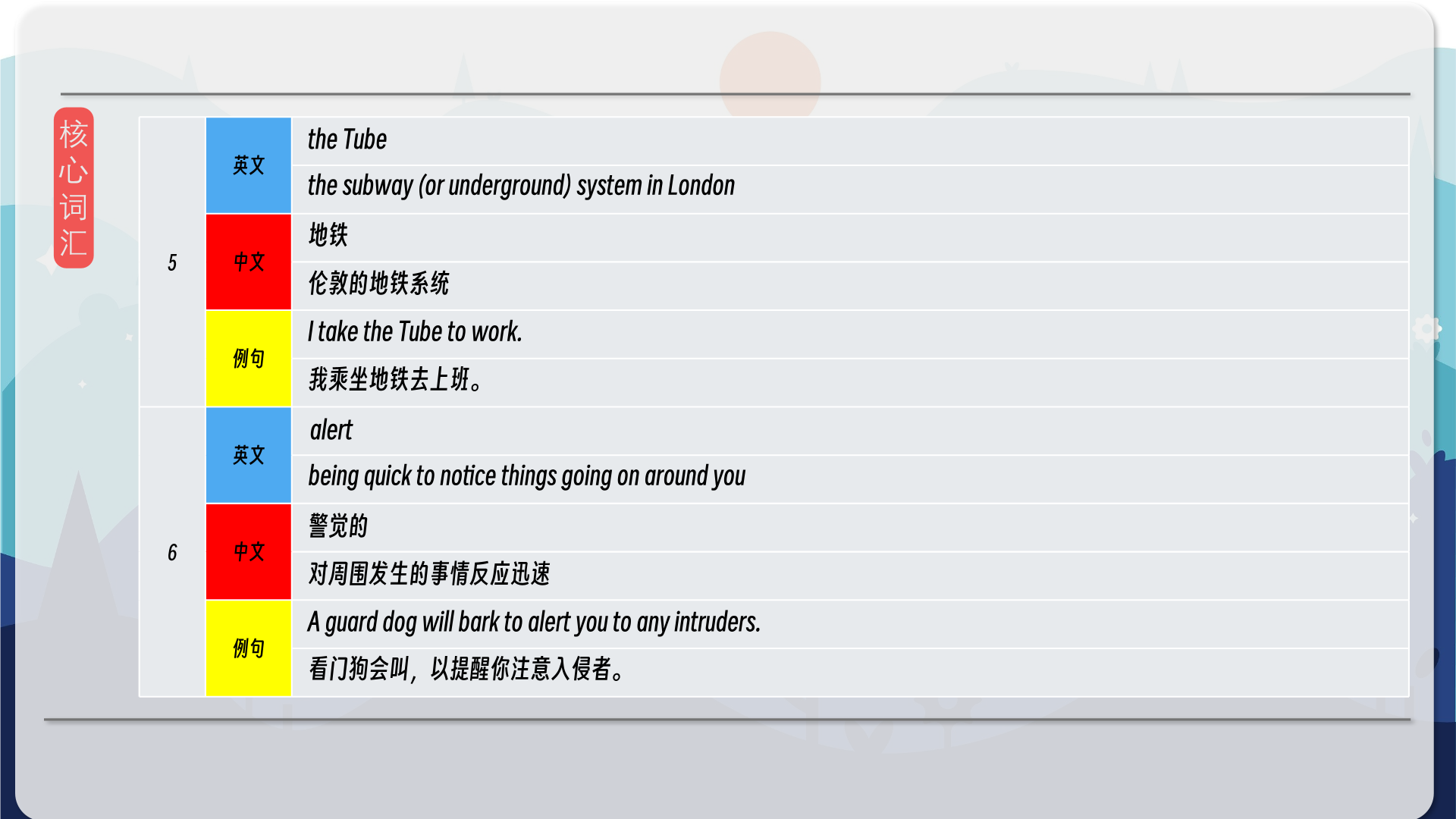
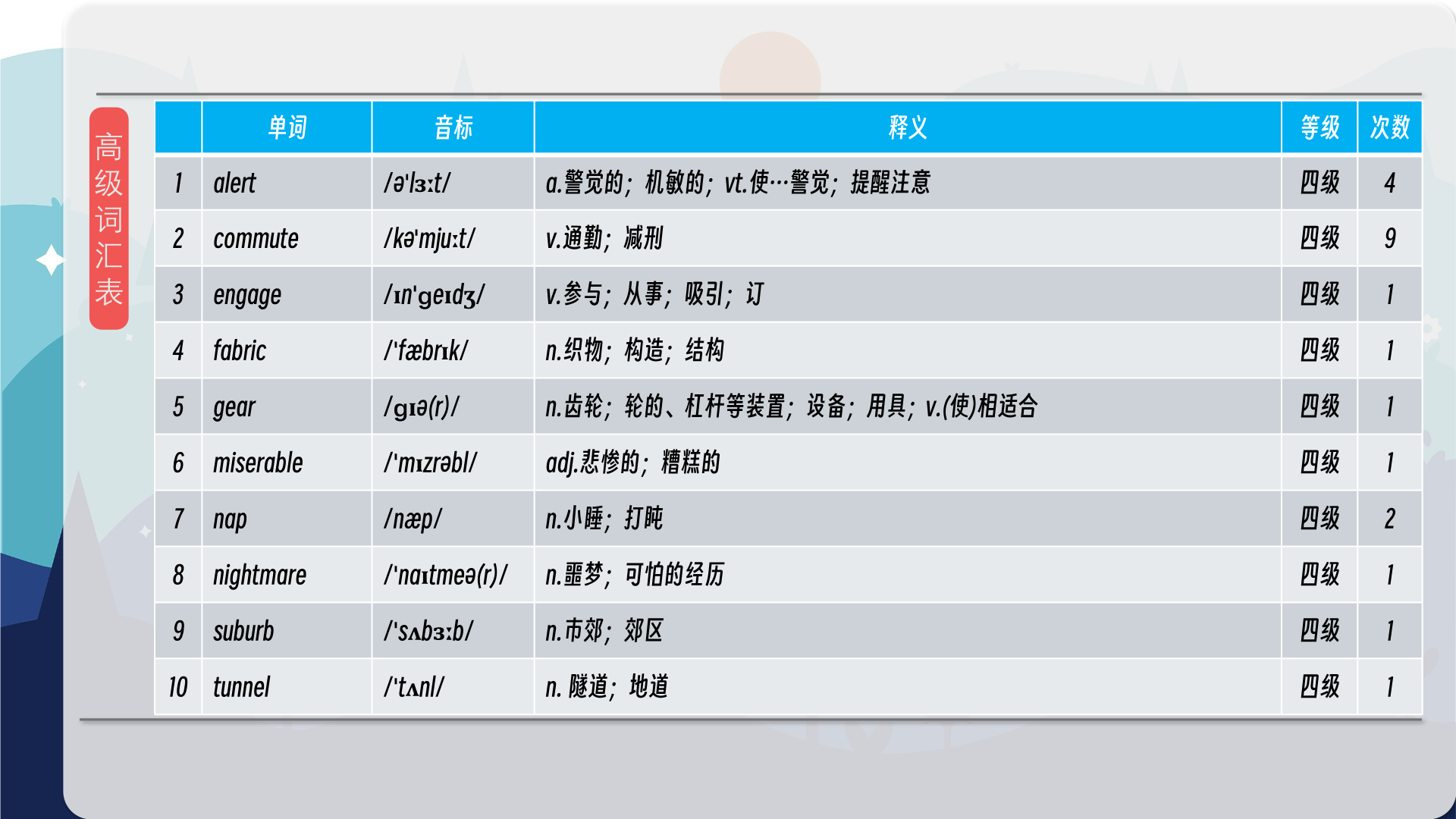
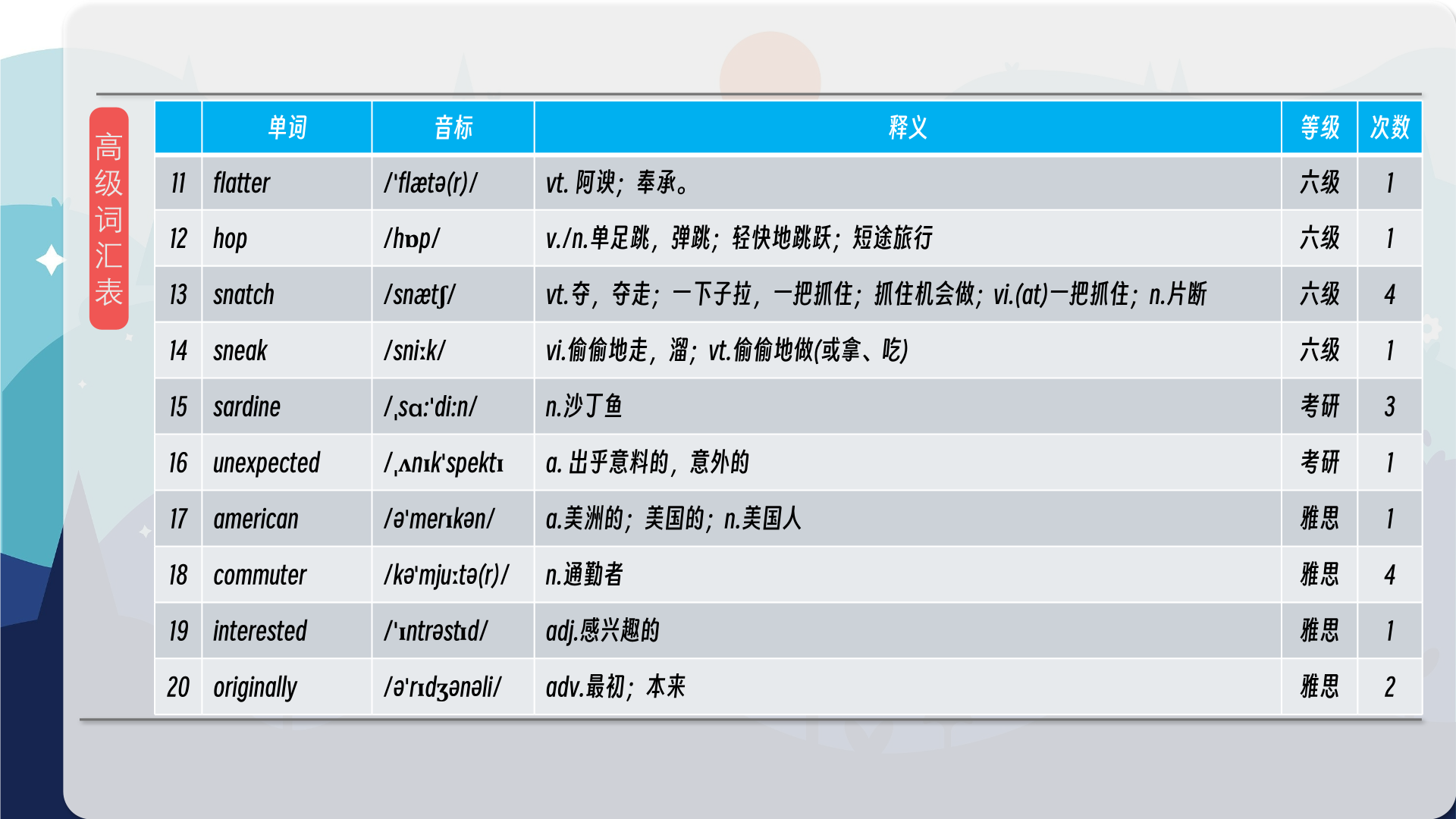
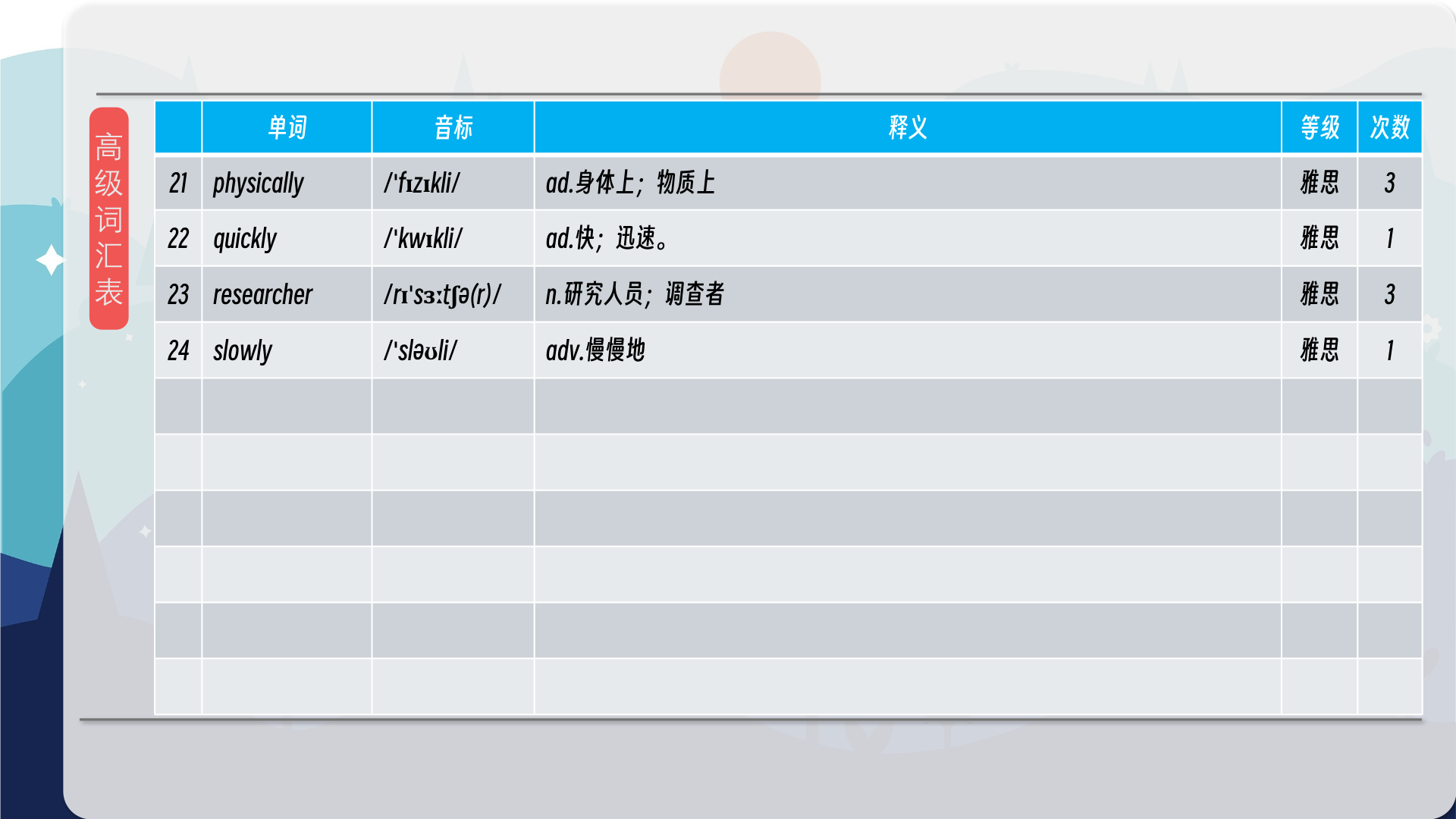

【核心词汇】
foldaway bike
a bike that folds up so it’s easy to carry or put away
折叠自行车
一种可以折叠起来以便于携带或存放的自行车
I’m looking for a foldaway bike.
我在找一辆折叠自行车。
lycra
a stretchy fabric used in tight-fitting sports clothes
莱卡
用于紧身运动服的一种弹性织物
Swimsuits made of Lycra dry quickly.
用莱卡制作的泳衣干得很快。
intrigued
very interested in something
感兴趣的
对某事物非常感兴趣
I was intrigued by his slow, deliberate way of talking.
他说话缓慢而谨慎的方式引起了我的兴趣。
commuting
travelling between your home and your work
通勤
往返于家和工作地点之间
The daily commuting is exhausting.
每天的通勤令人疲惫不堪。
the Tube
the subway (or underground) system in London
地铁
伦敦的地铁系统
I take the Tube to work.
我乘坐地铁去上班。
alert
being quick to notice things going on around you
警觉的
对周围发生的事情反应迅速
A guard dog will bark to alert you to any intruders.
看门狗会叫,以提醒你注意入侵者。
在公众号里输入6位数字,获取【对话音频、英文文本、中文翻译、核心词汇和高级词汇表】电子档,6位数字【暗号】在文章的最后一张图片,如【220728】,表示22年7月28日这一期。公众号没有的文章说明还没有制作相关资料。年度合集在B站【六分钟英语】工房获取,每年共计300+文档,感谢支持!